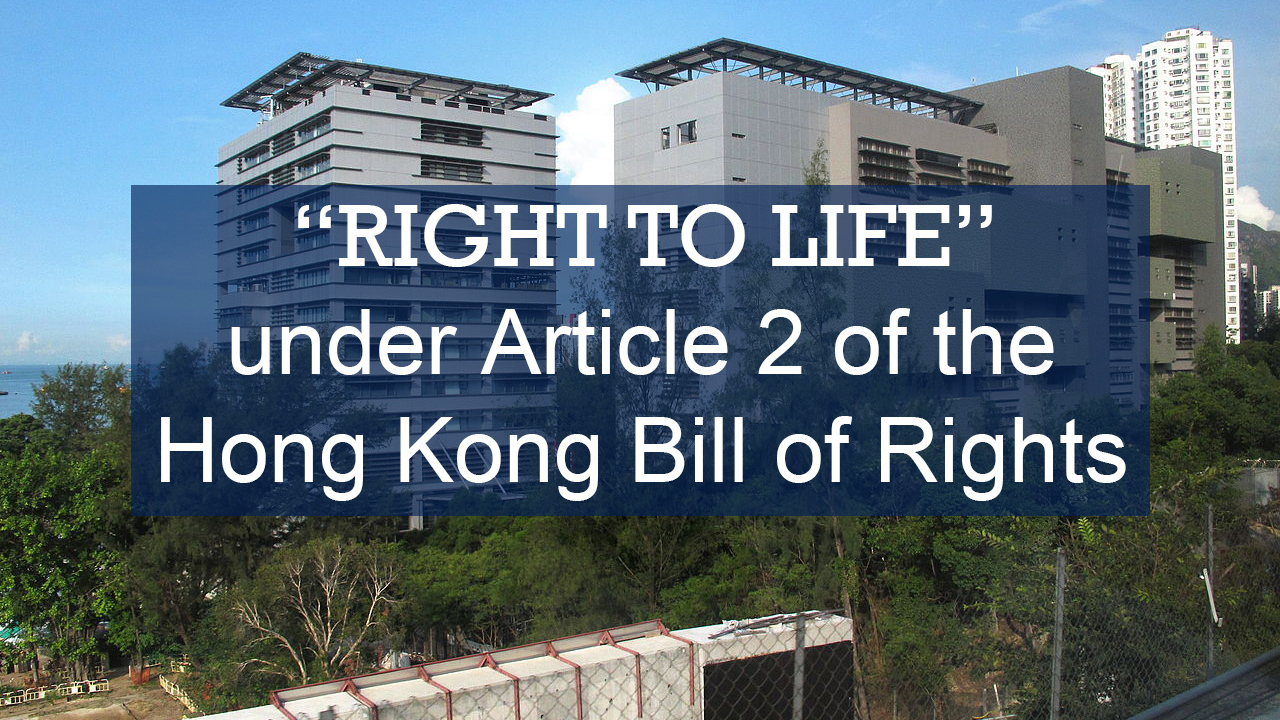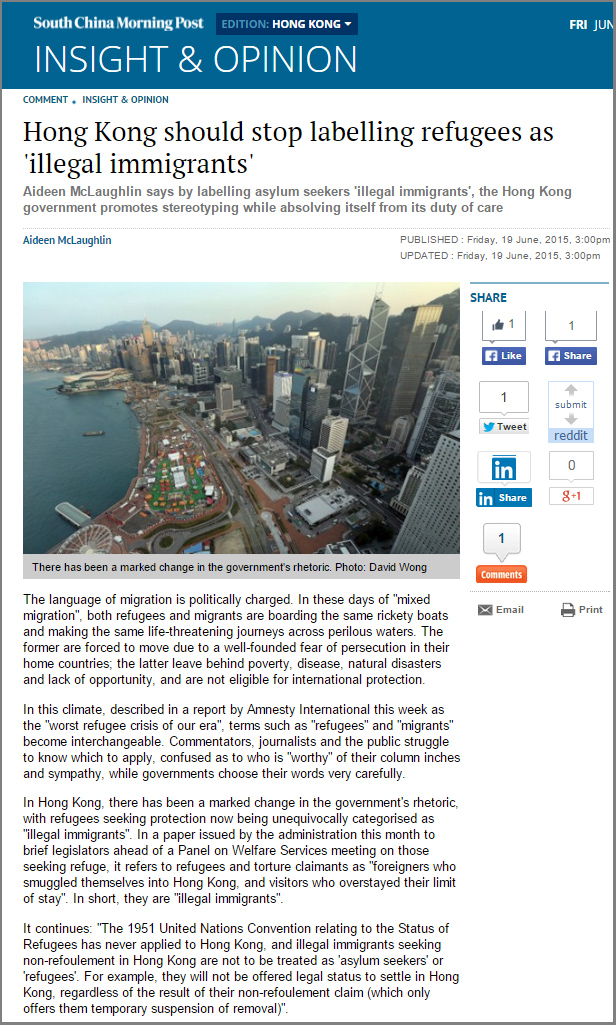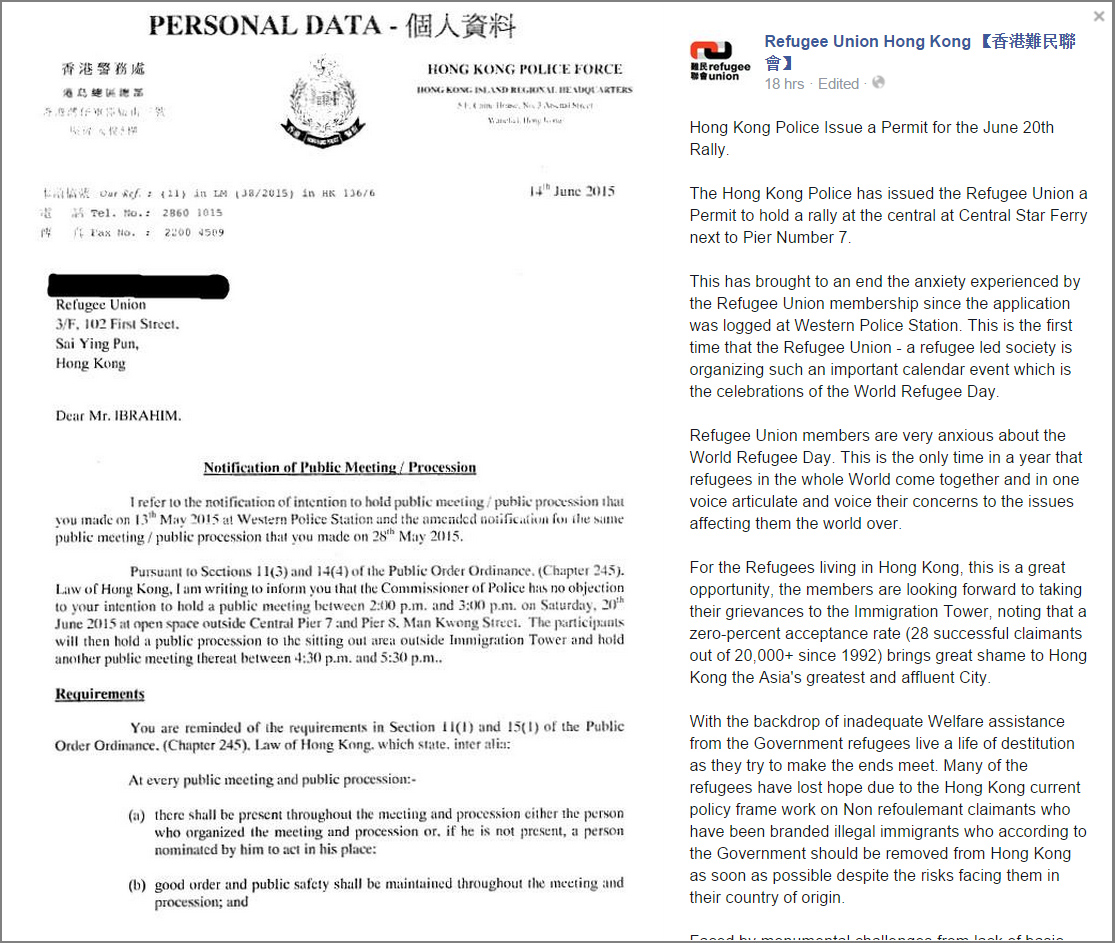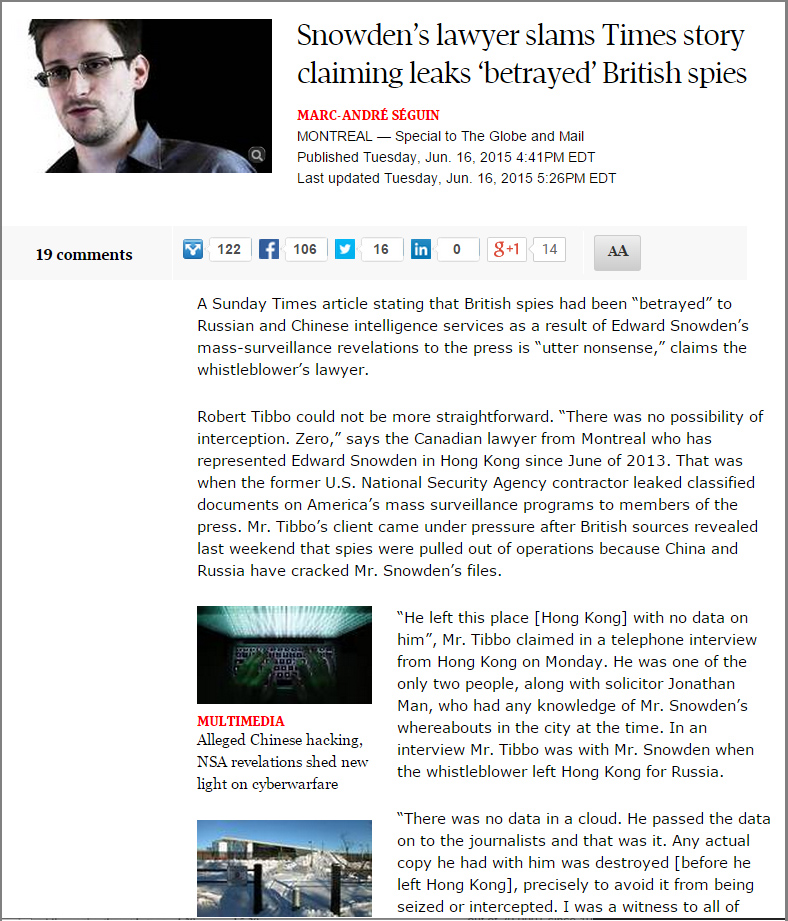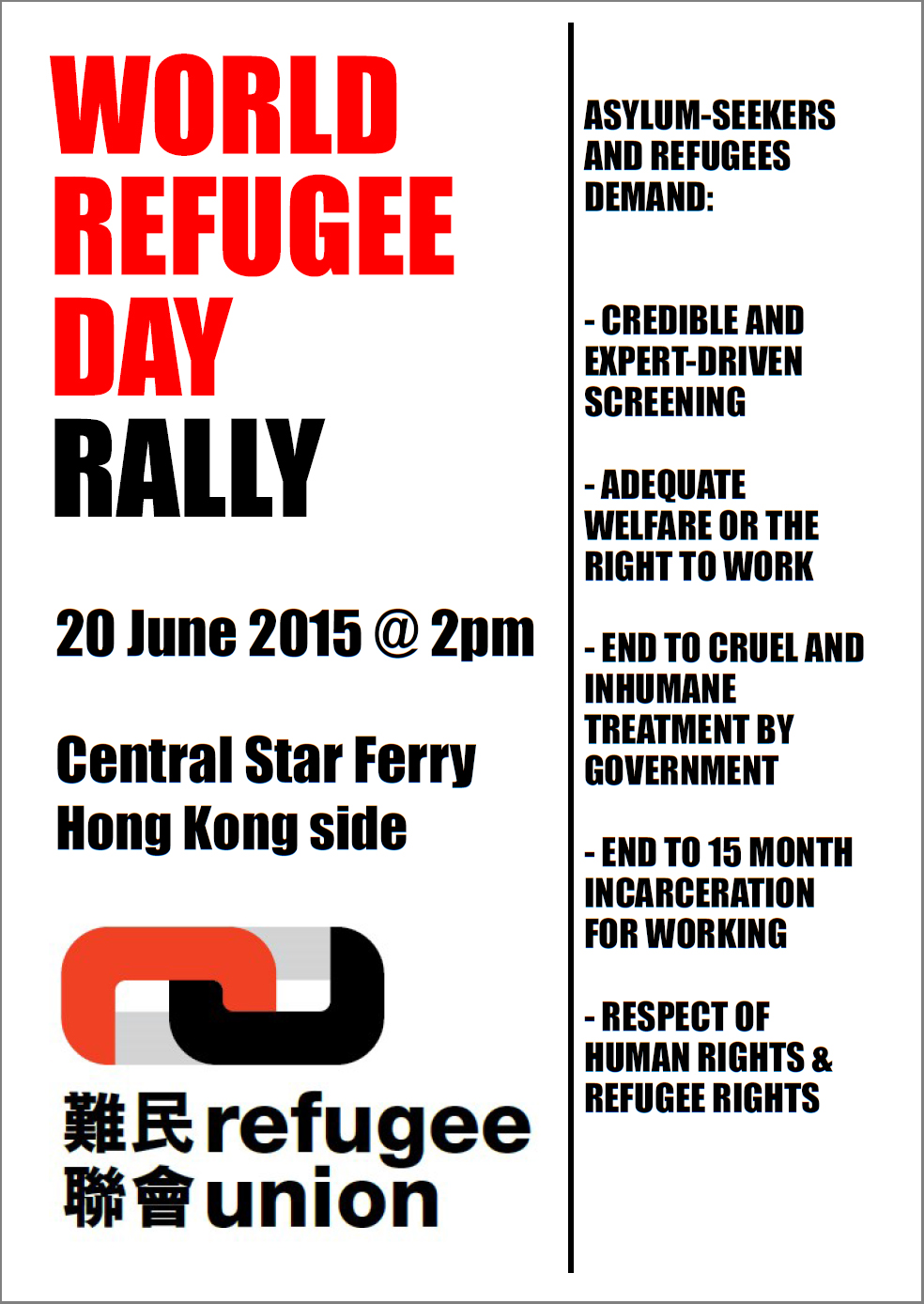Archive
Hong Kong should stop labelling refugees as ‘illegal immigrants’
Jun 19th, 2015 | Government, Media | Comment
Does Hong Kong favour fake systems?
Jun 19th, 2015 | Immigration, Rejection, VF Opinion | Comment
Abraham Lincoln is attributed the saying, “You can fool all the people some of the time and some of the people all the time, but you cannot fool all the people all the time.”
According to many refugees who watched a live news-feed at Vision First office, this maxim might apply to the Hong Kong’s 2017 electoral reform. Few are in any doubt about the government’s flagging popularity and the escalating challenges it is likely to face after a pro-establishment walk-out bungled the historical vote: 28 No – 8 Yes.
On offer was pseudo universal suffrage for the 2017 Chief Executive election, when eligible voters were expected to cast ballots for pre-approved candidates.
An African refugee observed, “It’s like in my country. Without rigging the election, the president would never win. It is fake universal suffrage! It is meaningless because voters cannot vote for their own choice, but only vote for whoever the Government will select. Hong Kong people are not stupid! They know it is a fake system promoted to legitimize whoever is put in power.”
A Pakistani refugee exclaimed, “Before, people accepted the governor sent from London, and now, they accept the Chief Executive approved by Beijing. But don’t tell them to vote for him, or to love him. The Government offered fake elections and the people said, ‘No thank you! You choose the leader, not us. So what is the meaning of everyone going out to vote for him?’”
As he assembled a sign for the World Refugee Day demonstration, another refugee remarked, “Hong Kong likes to have fake systems. Like the asylum screening (USM). There are lawyers, officers and appeal judges doing their important work, but the process is fake. Refugees know they cannot win their claims. Just like HK voters know they cannot win the election. You cannot fool all the people all the time!”
Rooted in painfully lived experience, these observation strike a chord. On paper, the Unified Screening Mechanism appears to offer protection, but how often does it grant it? Refugees complete forms, submit documents and attend interviews hoping for positive results. And then they wait, and wait and wait. The government arm is extended, but unreachable. The invisible hand holds back the promises made.
The refugee recognition rate speaks for itself. Since the UN Convention Against Torture (CAT) was extended to Hong Kong in 1992, more than 20,000 asylum seekers lodged claims with the Immigration Department, but only 28 were ever accepted, including several children born in Hong Kong.
That’s a 0.14% acceptance rate, a far cry from the 20-50% in develop countries, see Australia for example.
Can refugees be blamed for lamenting that the screening process lacks credibility? Claimants give less weight to the Immigration Ordinance, 480 duty lawyers and appeal judges, than to protection results, known as ‘substantiated claims’.
For the men and women who fear being repatriated into harm’s way, the complex and sophisticated screening mechanism is judged by its outcome – does it protect? Until results prove otherwise, it is hard to disagree that the Unified Screening Mechanism appears to be less than genuine.
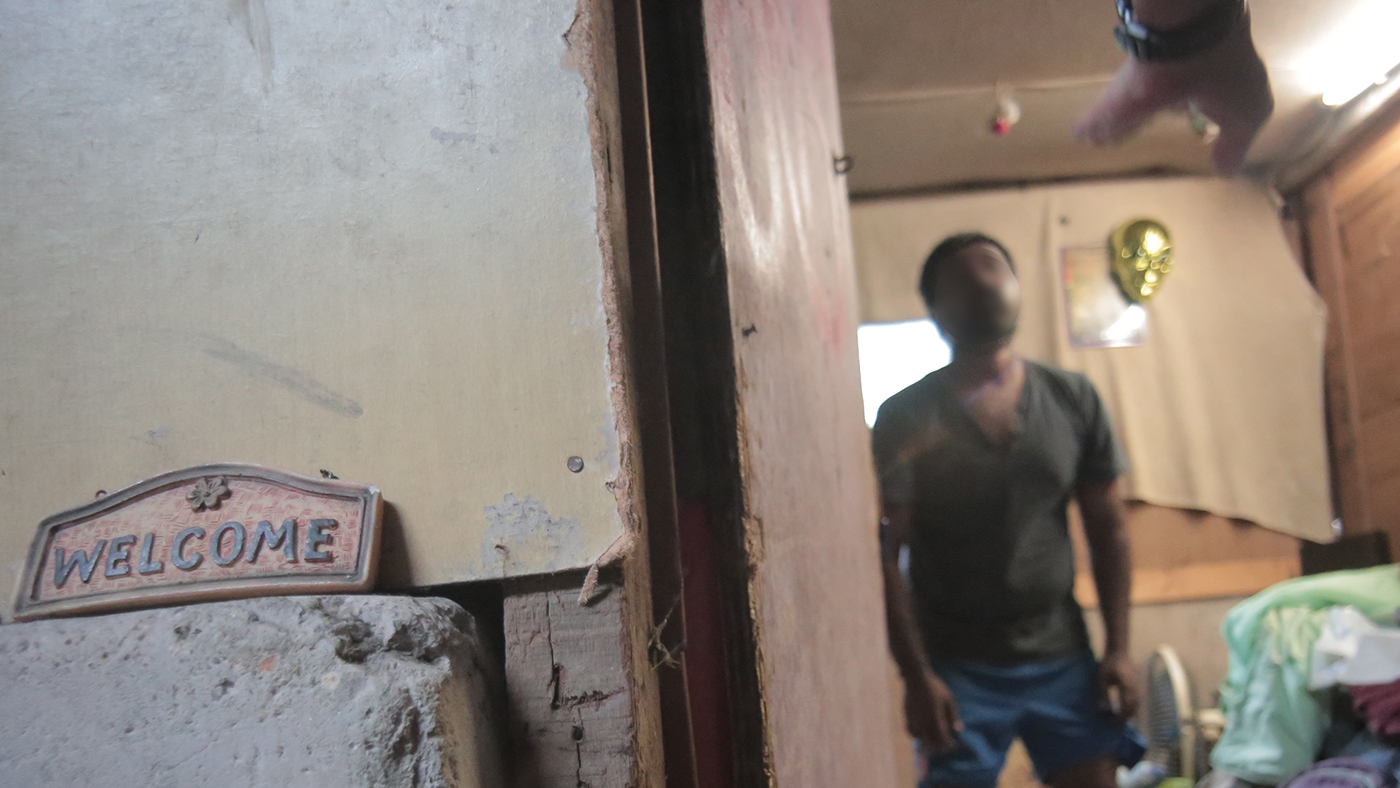
Refugee Union press release for World Refugee Day 2015
Jun 18th, 2015 | Immigration, Media, Refugee Community, Rejection | Comment
Original post on Refugee Union Facebook
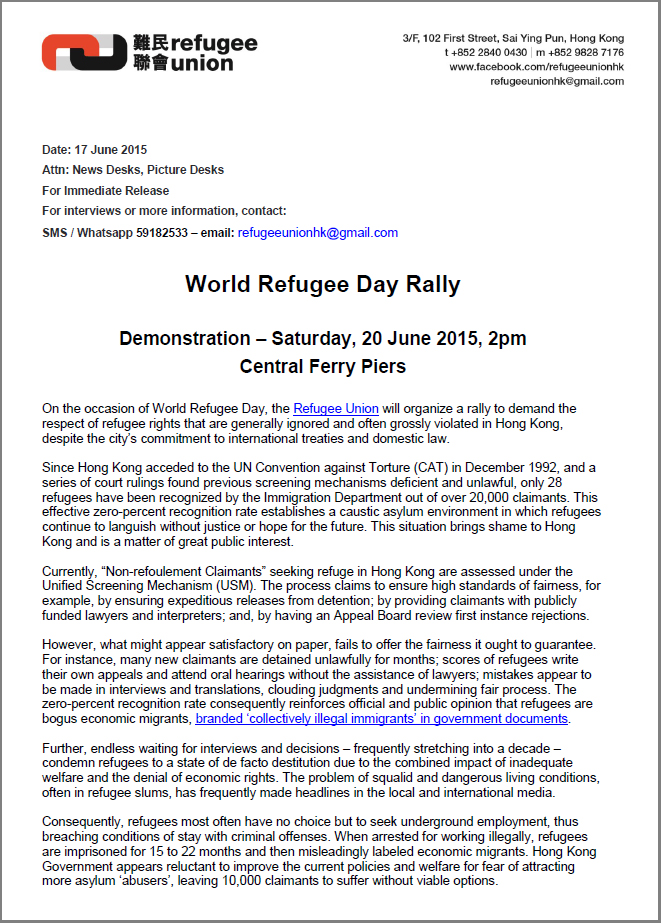
Judgment HCAL 91/2015 – Dhillon
Jun 18th, 2015 | Immigration, Legal, Rejection | Comment
UPDATE BLOG: “Immigration steps down removal of refugee”
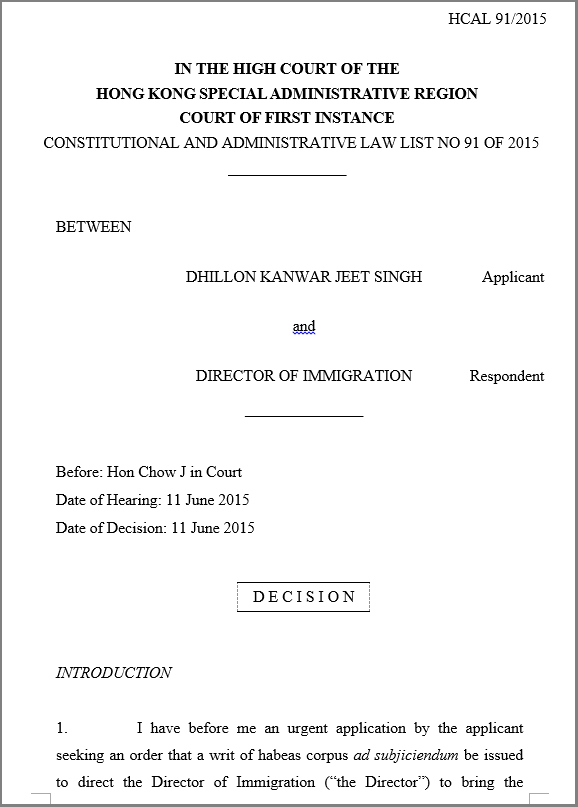
Hong Kong slowly poisons and kills me
Jun 17th, 2015 | Immigration, Personal Experiences, Welfare | Comment
My name is Irfan. I came to Hong Kong from (South Asia) in February 2006 to save my life. Soon it will be 10 years and after many, many interviews the Immigration Department has never made a decision on my case: not accepted and not rejected. Why it takes so long? Is it the right way to treat refugees?
My duty lawyer said, “Your case is different. You have a very special case. Your case is genuine.” But I respectfully say, there are hundreds of refugees in Hong Kong who have real cases. Why so few win? Our life and our family’s life are wasted because we don’t have protection, we don’t have work and we don’t have normal life.
In 2007 and 2008 I had five or six interviews at Immigration office in Central. Some were from morning till night. The officers told me to wait 3 to 9 months for the decision – but nothing happened. My Torture claim was not decided and in 2009, 2010, 2011 and 2012 nobody contacted me. I waited long time – but nobody called me.
When my USM interview started in 2014, I asked, “What was the decision from 2008?” But Immigration did not reply. They said, “Your case is strong and you must give interview one more time”. Is it fair that Immigration delay the decision on my case for 10 years without making a decision?
My lawyer said that Immigration cannot refuse my case, but why it takes so long? I came to Hong Kong because I have a problem. I like to save my life. I came when I was 21 and now I am 31 and nothing changed for me here. What do I have to do for my future? They don’t allow me to work and I am scared of breaking the law. Why Hong Kong Government treat refugees like this?
One day, my Immigration officer said, “You have waited a very long time. Sorry for this!” I answered, “The time I wasted will never come back. You consider how I spend my life, how I eat, how I live and how I suffer! If you (compensate me) for what I have lost, maybe I accept your sorry! I waited too long and I need my time back. But you cannot do that. Immigration just knows how to waste refugees’ time. I came to Hong Kong in February 2006 and now my hands are empty!”
I respectfully say to the Government: just give me the HK nationality, or let me work. If I do crime, you tell police that I am trouble. I have a baby. I am very stressed about my life. I want to do suicide, but I have to think about my family. If it is not allowed to give nationality, then allow me to do work. This is not criminal. My family is suffering. I don’t have money to help them. My daughter needs to go to school. I don’t have money. My daughter need shoes. I don’t have money. My wife needs clothes. I don’t have money. My ISS-HK case officer always says “You ask your friends”.
I came here to get a new life, but Hong Kong slowly poisons and kills me. Every moment, every minute I am suffering for what my wife and my daughter need. Immigration never give me response. The welfare is not enough. I always say this, but nobody listens to me. I cannot find mattress and bed for sleeping. I asked my ISS-HK case officer to help. She said “I will call you!” Almost going to be 6 months and she didn’t call me.
Hong Kong Government cannot protect or support me. Hong Kong Immigration make me slowly die, because they don’t give me freedom. I came here because I have a problem. But they don’t respect me, so I am not free. They tell me to sit – I must sit. They tell me to stand – I must stand. They say they help me, but how they help me? They just use the law to insult me. I say to the Government: Please give me permission to do work, so I can enjoy simple life with my family.
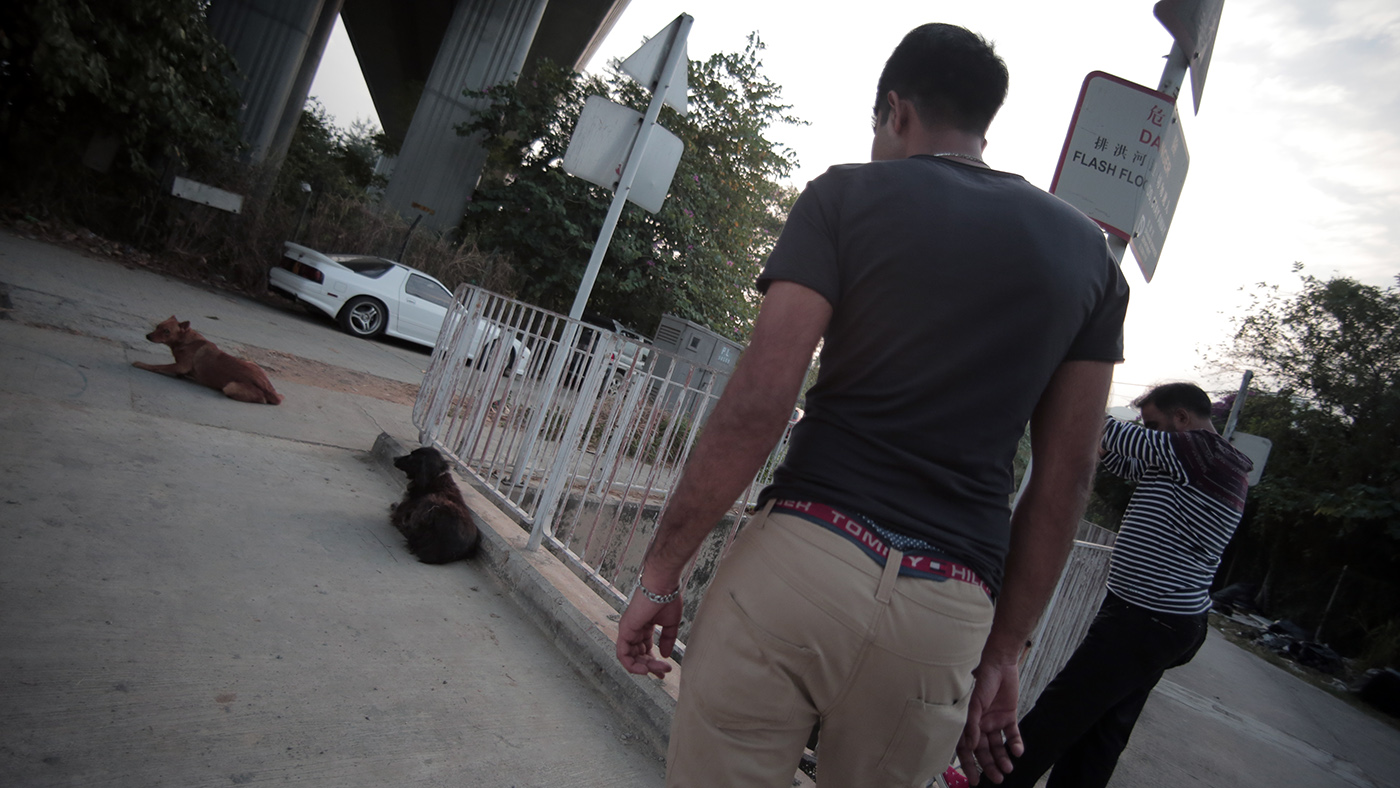
Police issues permit to Refugee Union for World Refugee Day rally
Jun 17th, 2015 | Refugee Community | Comment
Snowden’s lawyer slams Times story claiming leaks ‘betrayed’ British spies
Jun 17th, 2015 | VF Team | Comment
Fundamental human rights affected and violated by government mass surveillance
Jun 16th, 2015 | VF Team | Comment
On 8 June 2015, Barrister Robert Tibbo joined the Hong Kong University Conference (8 – 9 June 2015) on “Privacy & Innovation – In Pursuit of Right Incentives” organised by Associate Professor Marcelo Thompson of the University of Hong Kong Law & Technology Centre. On the panel for that day, along with Mr. Tibbo were legislator Charles Mok, as well as Anne Cheng (HKU), Frederick Borgesius (Amsterdam) and K.P. Chow (HKU).
Mr. Tibbo spoke on government mass surveillance focusing on the conduct of the Five-eyes group of nations’ illegal mass surveillance spying operations. He further discussed the role of the United States NSA, Canadian CSIS / CSEC and New Zealand GCSB illegal spying activities both domestically and internationally. He discussed how in democratic societies today, legislators and politicians have brought into effect legislation and instituted policies and practices that are creating authoritarian systems of governance.
Mr. Tibbo cited Canada as a prime example of this disturbing development in government, highlighting Canadian Prime Minister Stephen Harper’s Bill C-51, which is far more intrusive into civil liberties than the now expired US Patriot Act. He also cited other disturbing developments in the Canadian government, including “Carding” by the police, whereby police officer can stop anyone on the street and question them without cause and record that conversation, later depositing it into an electronic database.
Mr. Tibbo highlighted that the current oversight regimes (Legislation) in various jurisdictions are vague, ambiguous and thus rife with abuse and potential abuse by the authorities. He pointed out that current definitions of strategic covert surveillance seek to contain cogent evidence, as a means to deprive an accused, or a surveillance monitoring court, of all relevant evidence. Such practices are ripe for abuse as demonstrated in Canada, USA and other states where governments are increasingly using public immunity defence to carry out illegal spying activities on civilians.
The necessity for Whistleblower mechanisms to be put into place and its role in protecting society from human rights abuses was raised by Mr. Tibbo. He explained that without such systems there can never be any real oversight over government mass surveillance activities.
Such violation and the gradual but steady erosion of fundamental rights and freedoms of people due to government spying on their own electorate was explained by Mr. Tibbo. He further opined that this has a chilling effect on people, who were increasingly modifying their normal behaviour out of fear of the government and thus were restricting the exercise of their own human rights which includes:-
Freedom of Expression
Freedom of Thought, Belief and Conscience
Freedom of Association
Freedom of Assembly
Freedom of Movement / Mobility
Freedom of Religion
In effect, governments have been able to restrict or violate citizens’ rights through wider mass surveillance programs and draconian criminal laws. Mr. Tibbo mentioned that he has asylum seeking clients who have been subjected to government mass surveillance and consequential abuses in their home countries, and had sought refugee status in Hong Kong.
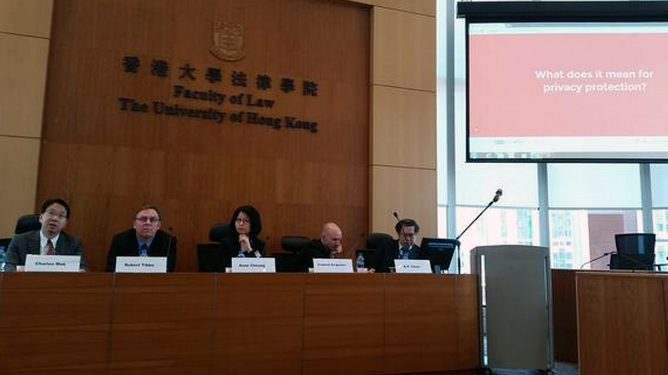
Immigration steps down removal process of refugee
Jun 15th, 2015 | Advocacy, Immigration, Legal, Rejection | Comment
An extraordinary effort by the Vision First pro bono legal team secured a significant success against the immigration machinery that processes, rejects and finally removes 99.9% of refugees who have the misfortune of seeking the protection of the Hong Kong Government.
The operation to secure the liberty of Mr. A (who cannot be named for legal reasons), a South Asian refugee who arrived in Hong Kong in 2014, commenced on 6 May 2015 when Barrister Mark Sutherland and solicitor Tam Kam Tong met him at a legal visit at the Castle Peak Bay Immigration Centre (CIC). On the same day, a request was made to the Immigration Removal Assessment Section (RAS) for his immediate release on the grounds that his detention was arbitrary and unlawful.
It transpired that Mr. A had been detained throughout the entirety of the process of assessment of his first tier non-refoulement claim a process which took more than four months. Vision First has previously commented on the Director of Immigration’s apparent disregard for the judgment in Ghulam Rbani v Secretary for Justice for and on behalf of the Director of Immigration [2014] 17 HKCFAR 138, which requires the Director to act expeditiously in releasing a refugee once a claim has been filed. Vision First is not persuaded that four months in Mr. A’s case can be said to be an expeditious move towards release on any reading. See our blog: Legal visit exposes apparent abuse in immigration detention centre.
The later refusal of Mr. A’s claim was inevitable in view of the Government’s rejection of virtually all first tier claims.
To pour salt on the wounds, the Appeal mechanism worked against Mr. A before it even got off the ground. His first tier lawyer provided by The Duty Lawyer Service told him “I will not help you on your appeal.” Mr. A was therefore left stranded to fight his own appeal. Vision First poses the rhetorical question: “How can this meet the high standards of fairness prescribed by the Court of Final Appeal circa ten years ago in Secretary for Security v Sakthevel Prabakar [2005] 1 HLKRD 289?”
Although the facts that compelled Mr. A to claim asylum are not yet known in detail, and might or might not be meritorious, that a lawyer was not assigned to his appeal prejudiced the high standards of fairness required for the determination of his claims. Barrister Sutherland observed, “It is an issue of real justice. The first instance lawyer refused to assist and a second opinion on merits was not apparently provided. It was not a level playing field. The refugee was ambushed by the appeal process without any chance of success. This case might expose a troubling lacuna in the Unified Screening Mechanism.”
The complex process that led to Mr. A’s release tried the skills and determination of his lawyers. The Director of Immigration, Mr. K.K. Chan did not consider the grounds put forward for his release and instead scheduled his removal on a flight out of Hong Kong on 11 June 2015. The morning before, Mr. A. called Arif of the Refugee Union pleading for an urgent intervention. Time was of the essence, because he was scheduled to be taken to the airport the following day.
In the morning of 11 June 2015, the legal team comprising Barrister Sutherland and solicitor Tam, acting on a pro bono basis, made an urgent application for a writ of habeas corpus ad subjiciendum, coupled with an application for stay of execution of the removal order.
An ex parte hearing on notice was set for that afternoon at which Mr. Sutherland submitted to the Hon. Judge Chow that Mr. A could not be removed because he had not exhausted his legal remedies. These included an application for leave for a judicial review of his asylum claim rejection, as well as a damages claim for unlawful detention, not to mention an appeal against the refusal of legal aid.
The application was won by the Director of Immigration, who was represented at the hearing, despite the first-tier Notice of Decision and the Appeal Decision not having been made available in Court. This was against the backdrop of requests made to the Director of Immigration and The Duty Lawyer Service to produce all the documents pertaining to this case, all of which remain unanswered.
A message from a Refugee Union member later circulated on social media, “This calls for the Union to have heart. I saw our lawyer and barrister sweating on behalf of the refugee and I felt like collapsing due to the Immigration lawyer was insisting on removal. I saw people who don’t have empathy at all. Anyway we need to push forward.” Her disappointment was certainly shared by her colleagues.
After the hearing, the Immigration officers and Department of Justice Counsel Mr. Lawrance Chan were clearly pleased with the result, as evidenced by their smiling faces.
After the Court hearing, Solicitor Tam and Arif rushed to the airport to seek urgent instructions, but Mr. A was nowhere to be found. Both Immigration and the Police could not shed any light on his whereabouts.
Early the following day Barrister Sutherland recalls, “I personally telephoned CIC to ascertain Mr. A’s whereabouts and to notify Immigration Officer Mr. S.K. Wong that an urgent legal visit had been requested for later that day. To this, Mr. Wong, whilst confirming that Mr. A was at CIC, sounded surprised and replied, ‘You had better be quick because we are taking him to the airport tonight’”.
In the afternoon of 12 June 2015, the legal team met a visibly shaken Mr. A in CIC. He was afraid of being deported. It is likely that CIC officers had informed him about the High Court failure, at which he was not present despite the requirement for authorities to “produce the body” in habeas corpus proceedings, which is Latin for “you [shall] have the body”. It became apparent that the next few hours would be crucial as the Director of Immigration, Mr. K.K. Chan decides to either remove or release the refugee.
Mr. A’s “Right to Life” claim under Article 2 of the Bill of Rights had since been filed and the Director of Immigration warned not to remove him due to this further legal impediment.
At 6pm a triumphant Barrister Sutherland reported, “There is a new term in the asylum vocabulary. The Director of Immigration decided to STEP DOWN the removal procedures. Mr. A’s “Right to Life” application was accepted and tonight he will be moved to Ma Tau Kok (Immigration office). I expect he will be released very soon. The removal was successfully stopped at the eleventh hour.”
Later that evening Arif of the Refugee Union received an unexpected phone call from Ma Tau Kok. Arif reported, “Mr. A just called me from Ma Tau Kok. He could not contain his happiness. What a difference a day can make! This morning he was desperate because he was sure he would be deported. Tonight he couldn’t be happier because he is still in Hong Kong. He is so thankful for those who fight so hard for him.”
Vision First is pleased to report that Mr. A was released from detention on Saturday, 13 June 2015. It is now our tum to smile.
